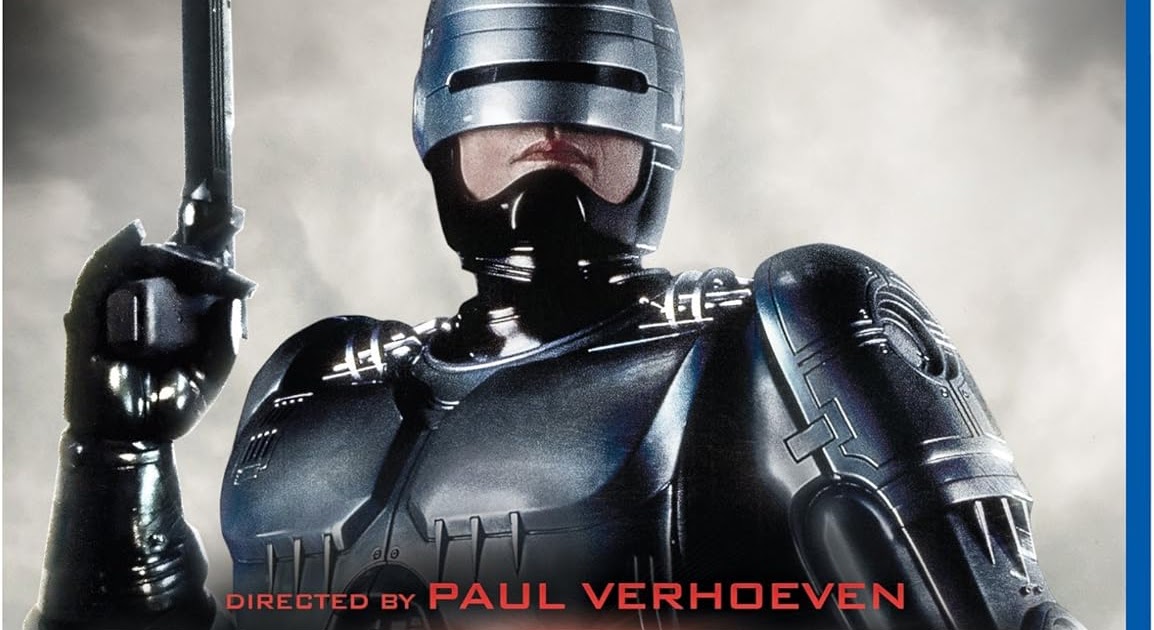RoboCop was not technically Paul Verhoeven’s first U.S. film (and he’d been directing features for years in the Netherlands) but it was the movie that put him on the map in a big way.
This is a dystopian cyberpunk science fiction thriller but in tone it’s a million miles away from the most famous dystopian cyberpunk science fiction thriller of the 80s, Blade Runner. RoboCop, disturbingly but interestingly, adds a lot of comic touches to an otherwise rather dark tale.
Alex Murphy (Peter Weller) is a Detroit cop who has just been assigned to the toughest precinct in a city in which violent crime is totally out of control. What he doesn’t know is that he has been set up to be killed. The Detroit Police Department is now controlled by a private corporation, Omni Consumer Products (OCP). The corporation is about to demolish the entire city and build a brand new high-tech city (to be called Delta City) on the site. To carry out their plan they need total control, including total control of law enforcement. The potential profits are enormous.
They intend to reduce the costs of policing to a bare minimum. Their initial idea was to build law enforcement robots but the prototype developed a very unfortunate glitch. Just a minor bug in the system – it blew away a OCP executive for no reason at all. It put about two hundred bullets into the guy.
An ambitious mid-level exec has a better idea – cyborg cops. To build a cyborg cop you first need a real cop who is as close to being dead as possible. They’ve selected some promising candidates, like Alex Murphy, and assigned them to duties where the possibility of being killed becomes practically a certainty. Much to OCP’s joy Alex Murphy is soon blown apart by criminals. Now there’s not much left that’s salvageable, but enough for their purposes. Alex Murphy will become the prototype RoboCop.
RoboCop’s brain is part human and part electronic. His personal memories have been erased but his policing expertise and experience is still there because those things are useful. His personality has been all but destroyed because it’s not useful to OCP. At least in theory Alex’s personality has been destroyed but whether that’s true in practice remains to be seen.
We, the audience, know who shot Murphy. It was a very nasty crime lord named Clarence Boddicker (Kurtwood Smith). Boddicker and his goons tortured Murphy first, in a scene in which Verhoeven portrays Murphy as a kind of Christ figure (Verhoeven states this in the audio commentary so it’s not speculation on my part).
RoboCop is not supposed to have any memories but he does have some incoherent images in his mind of his catastrophic encounter with Clarence Boddicker. RoboCop is not supposed to have any personal feelings but he develops an obsession with these disjointed memories.
Murphy’s partner on that fatal night had been Officer Anne Lewis (Nancy Allen). She doesn’t know that RoboCop is Murphy but she suspects that maybe he could be.
When it comes to cleaning up crime RoboCop is a huge success.
There are power struggles within OCP, with ambitious executives happy to stab each other in the back to get to the top. RoboCop’s success or failure can mean the difference between success and failure for some very ruthless men. For Bob Morton (Miguel Ferrer) there’s a great deal at stake – his entire career. It would be a disaster if RoboCop developed any glitches. Glitches like remembering what happened on that fateful night. RoboCop might then embark on a campaign of revenge.
This is an exciting adrenalin-rush action movie but there’s a lot more going on. There’s a lot of black humour. There’s satire here as well. Now it has to be said that Verhoeven’s approach to satire is subtle in the way being hit by a baseball bat is subtle. On the other hand it is undeniably effective. It works because, like any good satire, it’s accurate. It’s just an exaggeration of things that we feel to be true.
There’s also a surprising amount of emotion. Machines don’t feel emotions but men do and while OCP thinks of RoboCop as a machine that’s not quite the case. RoboCop doesn’t quite understand his emotions because his memories are so fragmentary but he does have emotions, as we discover in one extremely powerful and effective scene in what was once Murphy’s house.
This is a dystopian future with an unsettling degree of plausibility. In 1987 a society under the boot heel of advanced digital technology really was science fiction. Today it’s everyday reality.
It’s all done with old school special effects – things like matte paintings and miniatures and stop-motion animation. RoboCop isn’t a CGI effect – he’s actor Peter Weller in a very elaborate rubber suit. This gives the movie a feeling of solidity, of reality, that you just don’t get with modern CGI. We really do understand that RoboCop is still to some degree a man rather than a mere machine. The problem is that RoboCop doesn’t know to what extent he’s still human.
A very similar idea would be developed in a slightly different way a few years later in the superb Japanese sci-fi anime movie Ghost in the Shell (1995).
RoboCop is an intelligent science fiction action movie with some interesting emotional nuance. Highly recommended.
The edition I saw was the Director’s Cut Blu-Ray which looks great and is packed with extras.




